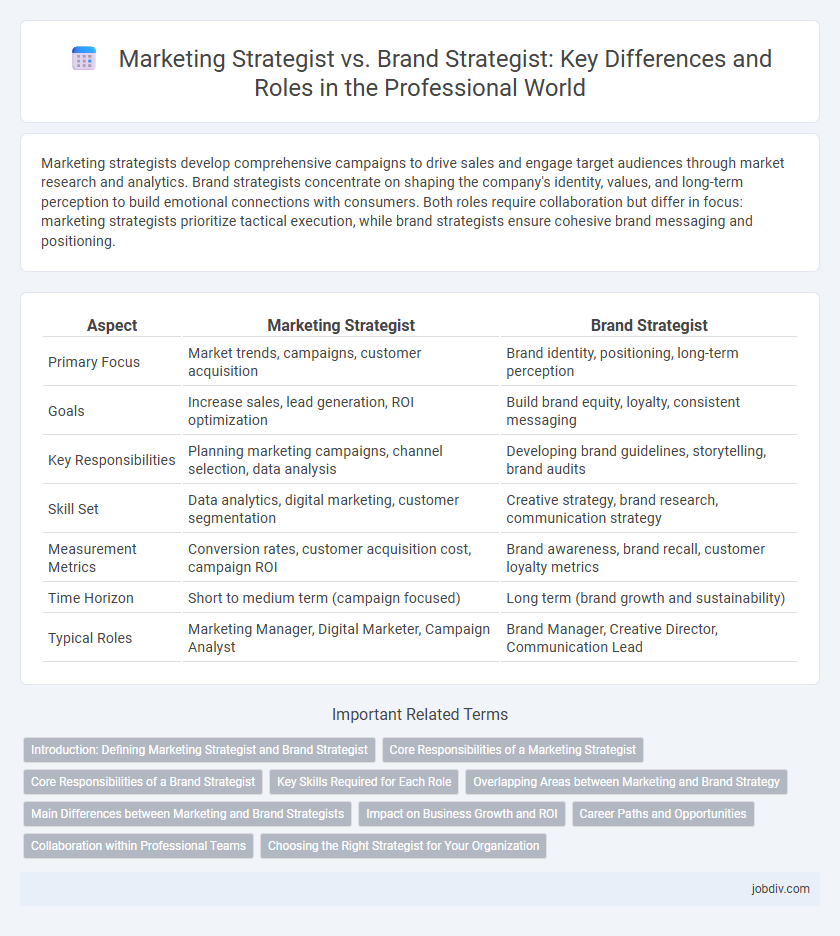Marketing strategists develop comprehensive campaigns to drive sales and engage target audiences through market research and analytics. Brand strategists concentrate on shaping the company's identity, values, and long-term perception to build emotional connections with consumers. Both roles require collaboration but differ in focus: marketing strategists prioritize tactical execution, while brand strategists ensure cohesive brand messaging and positioning.
Table of Comparison
| Aspect | Marketing Strategist | Brand Strategist |
|---|---|---|
| Primary Focus | Market trends, campaigns, customer acquisition | Brand identity, positioning, long-term perception |
| Goals | Increase sales, lead generation, ROI optimization | Build brand equity, loyalty, consistent messaging |
| Key Responsibilities | Planning marketing campaigns, channel selection, data analysis | Developing brand guidelines, storytelling, brand audits |
| Skill Set | Data analytics, digital marketing, customer segmentation | Creative strategy, brand research, communication strategy |
| Measurement Metrics | Conversion rates, customer acquisition cost, campaign ROI | Brand awareness, brand recall, customer loyalty metrics |
| Time Horizon | Short to medium term (campaign focused) | Long term (brand growth and sustainability) |
| Typical Roles | Marketing Manager, Digital Marketer, Campaign Analyst | Brand Manager, Creative Director, Communication Lead |
Introduction: Defining Marketing Strategist and Brand Strategist
A Marketing Strategist specializes in analyzing market trends, consumer behavior, and competitive landscapes to develop comprehensive plans that drive product promotion and sales growth. A Brand Strategist focuses on shaping and managing a brand's identity, values, and messaging to create a consistent and compelling perception among target audiences. Both roles are essential for aligning business objectives with customer engagement, but their core emphasis differs between market tactics and brand narrative development.
Core Responsibilities of a Marketing Strategist
A Marketing Strategist primarily focuses on analyzing market trends, identifying target audiences, and developing comprehensive campaigns to drive sales and increase market share. They use data-driven insights to allocate budgets effectively, optimize advertising channels, and measure campaign performance against key performance indicators (KPIs). Their core responsibility is to align marketing initiatives with business objectives, ensuring a strategic approach to customer acquisition and retention.
Core Responsibilities of a Brand Strategist
A Brand Strategist focuses on developing a cohesive brand identity that aligns with the company's vision, ensuring consistent messaging across all platforms to build customer loyalty and drive market differentiation. Their core responsibilities include analyzing market trends, conducting competitor research, and crafting brand positioning strategies that resonate with target audiences. They collaborate closely with creative teams and marketing departments to implement brand guidelines and monitor brand performance through key metrics and consumer feedback.
Key Skills Required for Each Role
Marketing strategists excel in data analysis, market research, and campaign planning to drive customer acquisition and revenue growth. Brand strategists specialize in brand positioning, storytelling, and visual identity development to enhance brand equity and customer loyalty. Both roles require strong communication skills, creativity, and a deep understanding of consumer behavior to align strategies with business objectives.
Overlapping Areas between Marketing and Brand Strategy
Marketing strategists and brand strategists both aim to enhance business growth, focusing on customer engagement and market positioning. Their overlapping areas include market research, audience segmentation, and the development of messaging that aligns with brand identity and marketing goals. Integration of marketing campaigns with brand values ensures consistent communication across channels, driving brand loyalty and competitive advantage.
Main Differences between Marketing and Brand Strategists
Marketing strategists focus on market research, consumer behavior analysis, and campaign execution to drive short-term sales and achieve business goals, utilizing tools like digital marketing, SEO, and analytics. Brand strategists concentrate on defining brand identity, creating consistent messaging, and building long-term emotional connections with target audiences to enhance brand equity and loyalty. The key difference lies in marketing strategists targeting immediate market opportunities while brand strategists cultivate enduring brand perception and positioning.
Impact on Business Growth and ROI
Marketing strategists drive business growth by optimizing multi-channel campaigns and leveraging data analytics to maximize ROI through targeted customer acquisition and retention strategies. Brand strategists build long-term brand equity and increase market share by crafting cohesive brand identities and emotional connections that enhance customer loyalty and lifetime value. Both roles contribute to sustainable revenue growth, but marketing strategists focus on immediate performance metrics, whereas brand strategists emphasize enduring brand strength and reputation.
Career Paths and Opportunities
Marketing strategists develop comprehensive plans to increase market share and drive sales through targeted campaigns and data analysis, often leading to roles in product management or digital marketing leadership. Brand strategists focus on building brand identity and customer loyalty by shaping brand messaging and positioning, paving pathways toward brand management or creative director positions. Both careers offer growth opportunities in diverse industries, with marketing strategists leaning toward analytical roles and brand strategists emphasizing creative and perceptual expertise.
Collaboration within Professional Teams
Marketing strategists and brand strategists collaborate closely to align marketing campaigns with brand identity, ensuring cohesive messaging across all channels. Marketing strategists analyze target audiences and market trends, while brand strategists focus on developing a consistent brand voice and visual identity. Effective collaboration within professional teams enhances overall strategy execution, driving stronger customer engagement and brand loyalty.
Choosing the Right Strategist for Your Organization
Selecting the right strategist involves understanding that a Marketing Strategist focuses on targeted campaigns and customer acquisition through data-driven tactics, while a Brand Strategist centers on cultivating brand identity and long-term perception across all touchpoints. Organizations aiming to boost immediate sales and lead generation benefit from marketing strategists, whereas those seeking to build strong emotional connections and loyalty should prioritize brand strategists. Assessing business goals, budget, and desired outcomes ensures alignment with the strategist's core expertise, maximizing overall impact.
Marketing Strategist vs Brand Strategist Infographic

 jobdiv.com
jobdiv.com